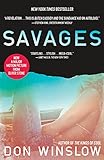I’ve been thinking lately that I should be reading more crime fiction. I’ve never been against it—in theory I’m in favor of anything good, regardless of genre, although I’ve never taken to werewolves—but I haven’t actively sought it out.
But since my second novel keeps getting categorized as crime fiction, my illiteracy in the genre that I’ve apparently been shoehorned into has become slightly uncomfortable. “What kind of a book have you written?” people ask.
“Um,” I say, “I guess it’s a sort of literary crime novel?” (I know. Awkward. But if you set out to write literary fiction and end up getting reviewed in Spinetingler Magazine, what are you supposed to call it?)
“Oh!” they say. “Have you read [insert name of high-profile crime writer whom I haven’t read but obviously should have if I’m claiming any sort of association with the genre]?”
The most recent books I’ve read in the genre confirm my long-held suspicion that attempting to categorize books by genre does readers a disservice; these books are no less literary than any of the other great books I’ve read this year, they just have crimes and/or guns in them. For your reading pleasure, two books you might consider reading even if you don’t think you like crime fiction very much:
1.
 Savages by Don Winslow: I think this book is perhaps best described as a Tarantino film crossed with a prose poem. It’s violent, beautifully written, and experimental, and I’ve never read anything like it. Structurally, it’s a dizzyingly intricate 290 chapters, the first one only two words long (1. “Fuck you.”)
Savages by Don Winslow: I think this book is perhaps best described as a Tarantino film crossed with a prose poem. It’s violent, beautifully written, and experimental, and I’ve never read anything like it. Structurally, it’s a dizzyingly intricate 290 chapters, the first one only two words long (1. “Fuck you.”)
Ben is a brilliant botanist who’s partnered up with his best friend, Chon, to produce and distribute the best pot on the West Coast. Chon, a former Navy SEAL who brought unspeakably high-quality marijuana seeds back from Afghanistan, has a girlfriend named O, but she sleeps with Ben too. Everyone’s in their twenties. The trio lead lives of hedonistic ease in Laguna Beach, until a vicious Mexican cartel arrives on the scene to stage a hostile takeover of the business.
The shifts in perspective are interesting; Winslow shifts back and forth within his central trio and then moves outward, until we’re reading short chapters from the viewpoint of practically every thug who populates the pages. The effect is fragmented, but effective. What I found most startling about this book was Winslow’s willingness to abandon conventional form and slip without warning in and out of a sort of loose poetry—
Slicing through SoCal
Cutting through a California night
The freeway (5) is soft and warm and
Welcoming
But for Ben
The green exit signs are like steps climbing up a scaffold
Toward O.
The cartel kidnaps O to speed up the takeover negotiations. The body count is considerable. The book’s practically impossible to put down.
2.
 Snowdrops by A.D. Miller: Snowdrops is as quiet as Savages is loud. The book opens with the early-spring discovery of a body; a snowdrop, in Moscow slang, a corpse hidden all winter under heavy snows. It appears with the first thaw in front of Nick Platt’s apartment building.
Snowdrops by A.D. Miller: Snowdrops is as quiet as Savages is loud. The book opens with the early-spring discovery of a body; a snowdrop, in Moscow slang, a corpse hidden all winter under heavy snows. It appears with the first thaw in front of Nick Platt’s apartment building.
It’s apparent from the first pages that a complicated crime is being played out, something slow and deadly unfolding over weeks and months; evidence of it is all around us even as we can’t see how the pieces fit together—until, of course, the trap snaps shut in the final chapters and the significance of the body in the first chapter falls devastatingly into place.
Nick Platt is a British lawyer who lives and works in Moscow in the early 2000s. One day in the Metro he meets a young woman, Masha, and quickly falls in love. His narration takes the loose form of a confession to his soon-to-be-bride, years later—“You’ve wanted to know why I haven’t talked to you about Russia”—although the deeper he goes into the story, the less certain the wedding seems.
Masha asks for his assistance in helping her aunt, Tatiana, move to a new apartment. The real story here isn’t the crime; it’s the extent to which we’re willing to lie to ourselves, to ignore the obvious, in pursuit of happiness or companionship or love. A lonely man in a foreign city, courted suddenly by a beautiful young girl, is willing to suspend disbelief even when her story begins to crumble and lies start showing through, even when he’s half-aware at every turn that he’s complicit in something dreadful and that everything is wrong. An intriguing debut, suffused with an atmosphere of dread.








